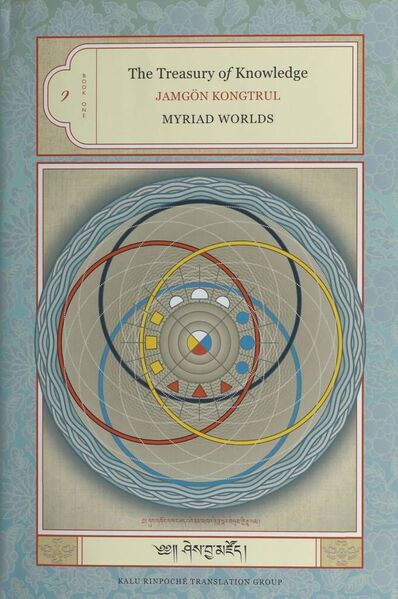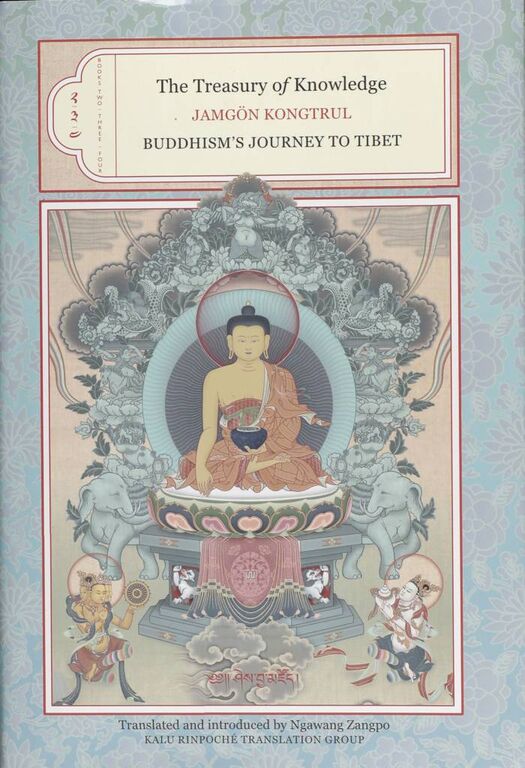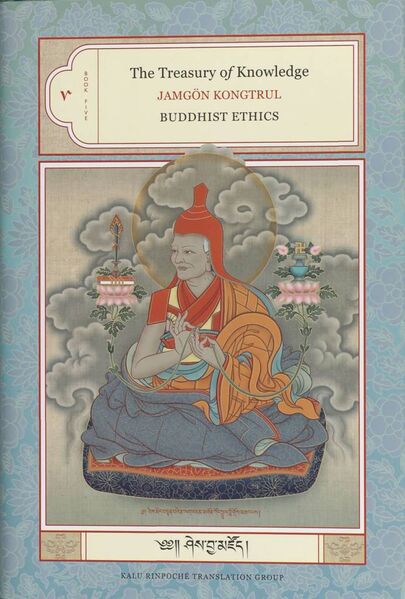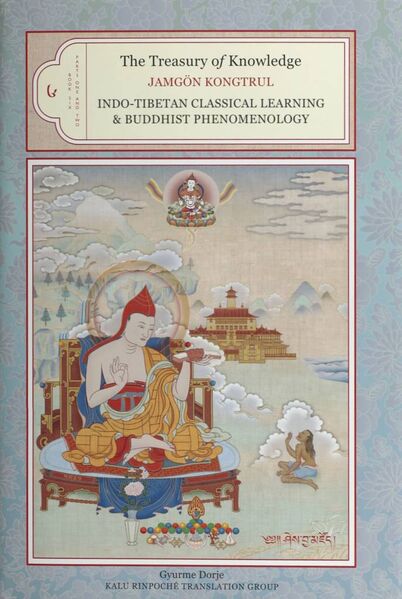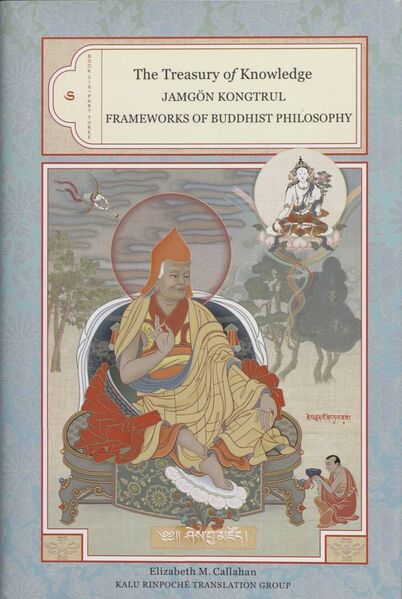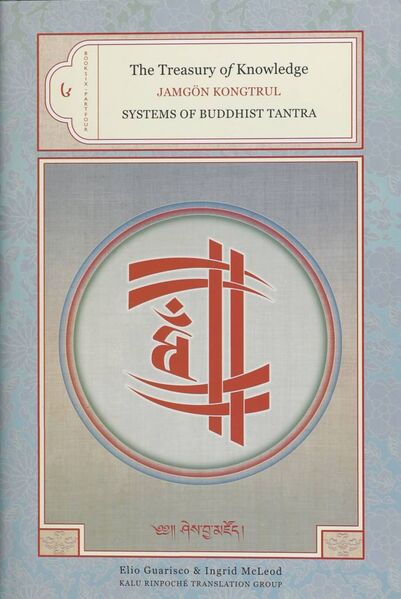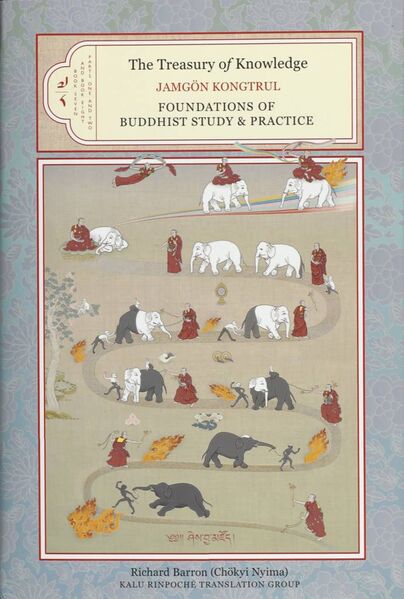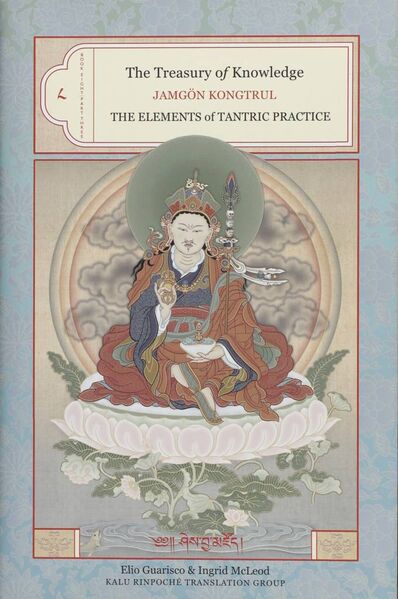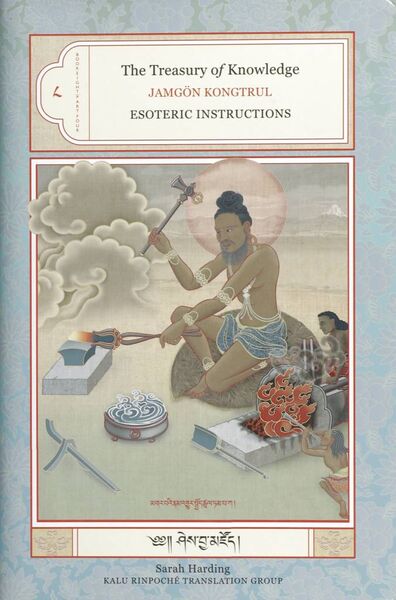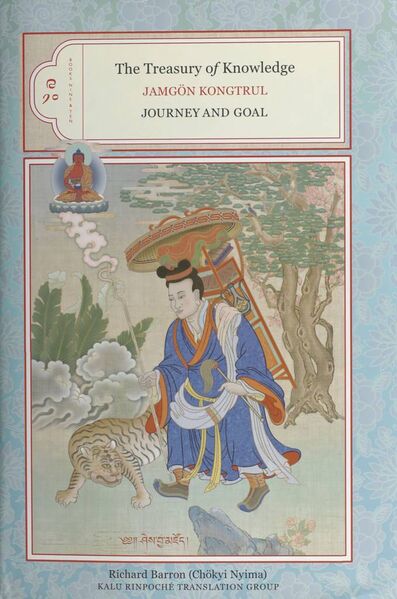The Treasury of Knowledge Series: Difference between revisions
From Buddha-Nature
((by SublimeText.Mediawiker)) |
M.Koblensky (talk | contribs) m (Text replacement - "commons.tsadra.org/images-commons" to "commons.tsadra.org/images") |
||
| (32 intermediate revisions by one other user not shown) | |||
| Line 7: | Line 7: | ||
<div id="page-content" class="container"> | <div id="page-content" class="wide-container"> | ||
<div class="row sticky-container offset"> | <div class="row sticky-container offset"> | ||
<div class="col-lg-9 mt-5 mt-lg-0"> | <div class="col-lg-9 mt-5 mt-lg-0"> | ||
<h2 class="hidden p-0 m-0 h-0">Book I: Myriad Worlds</ | <h2 class="mt-0 pt-0">Sponsor & Publisher</h2> | ||
|img_src=https://commons.tsadra.org/images | <div class="row"> | ||
{{ExTile | |||
|image=https://commons.tsadra.org/images/thumb/6/6b/Home-Page-Front-Buddha-Banner-bright.jpg/800px-Home-Page-Front-Buddha-Banner-bright.jpg | |||
|header=Tsadra Foundation | |||
|content=Visit the Tsadra Foundation page for this translation series, and browse the other translation projects of the foundation. | |||
|link=https://www.tsadra.org/publication/english-publications/treasury-of-knowledge-series/ | |||
}} | |||
{{ExTile | |||
|image=https://commons.tsadra.org/images/thumb/7/70/Shambhala_Logo-Color_flame_with_name.png/378px-Shambhala_Logo-Color_flame_with_name.png | |||
|header=Shambhala Publications | |||
|content=Visit Shambhala Publications' page for this series, and read the descriptions of each volume. | |||
|link=https://www.shambhala.com/treasuryofknowledge.html | |||
}} | |||
</div> | |||
<h2>The Source Text</h2> | |||
<h3 class="hidden p-0 m-0 h-0">Source: Shes bya kun la khyab pa'i mdzod</h3>{{#widget:BootsrapHorizontalCard | |||
|img_src=https://commons.tsadra.org/images/7/76/Kongtrul1.png | |||
|img_alt=Shes bya kun la khyab pa'i mdzod | |||
|card_title=Source: Shes bya kun la khyab pa'i mdzod | |||
|card_text=In Tibetan religious literature, its ten books stand out as a unique masterpiece embodying the entire range of Buddhist teachings as they were preserved in Tibet. In his monumental work, Jamgön Kongtrul presents an encyclopedic account of the major lines of thought and practice that comprise Tibetan Buddhism. | |||
|card_muted_small_text=More on the source text <i class="fad fa-angle-right align-middle"></i> | |||
|link=Texts/Shes_bya_kun_la_khyab_pa%27i_mdzod | |||
}} | |||
<h2>Translated Volumes</h2> | |||
<h3 class="hidden p-0 m-0 h-0">Book I: Myriad Worlds</h3>{{#widget:BootsrapHorizontalCard | |||
|img_src=https://commons.tsadra.org/images/thumb/8/82/Myriad_Worlds-front.jpg/398px-Myriad_Worlds-front.jpg | |||
|img_alt=Myriad Worlds | |img_alt=Myriad Worlds | ||
|card_title=Book I: Myriad Worlds | |card_title=Book I: Myriad Worlds | ||
|card_text=This first book of The Treasury which serves as a prelude to Kongtrul's survey describes four major cosmological systems found in the Tibetan tradition—those associated with the Hinayana, Mahayana, Kalachakra, and Dzogchen teachings. Each of these cosmologies shows how the world arises from mind, whether through the accumulated results of past actions or from the constant striving of awareness to know itself. | |card_text=This first book of The Treasury which serves as a prelude to Kongtrul's survey describes four major cosmological systems found in the Tibetan tradition—those associated with the Hinayana, Mahayana, Kalachakra, and Dzogchen teachings. Each of these cosmologies shows how the world arises from mind, whether through the accumulated results of past actions or from the constant striving of awareness to know itself. | ||
|card_muted_small_text=Read more on publisher page <i class="fad fa-angle-right align-middle"></i> | |card_muted_small_text=Read more on the publisher page <i class="fad fa-angle-right align-middle"></i> | ||
|link=https://www.shambhala.com/the-treasury-of-knowledge-book-one.html | |link=https://www.shambhala.com/the-treasury-of-knowledge-book-one.html | ||
}}< | |translators=<i>Translated by</i> Kalu Rinpoché Translation Group | ||
|img_src=https://commons.tsadra.org/images | }}<h3 class="hidden p-0 m-0 h-0">Books II, III, and IV: Buddhism's Journey to Tibet</h3>{{#widget:BootsrapHorizontalCard | ||
|img_src=https://commons.tsadra.org/images/thumb/1/1f/Buddhism%27s_Journey_to_Tibet-front.jpg/525px-Buddhism%27s_Journey_to_Tibet-front.jpg | |||
|img_alt=Buddhism's Journey to Tibet | |img_alt=Buddhism's Journey to Tibet | ||
|card_title=Books II, III, and IV: Buddhism's Journey to Tibet | |card_title=Books II, III, and IV: Buddhism's Journey to Tibet | ||
|card_text=Beginning with the appearance of the Buddha in our world (Book Two), it describes the Buddha's life, his enlightenment, and what he taught (Book Three) from a multitude of Buddhist viewpoints. Buddhism's transmission to and preservation in Tibet is the focus of the main part of this volume (Book Four), which describes the scriptural transmissions and lineages of meditation practice as well as the Buddhist arts that together make up the world of Tibetan Buddhism. | |card_text=Beginning with the appearance of the Buddha in our world (Book Two), it describes the Buddha's life, his enlightenment, and what he taught (Book Three) from a multitude of Buddhist viewpoints. Buddhism's transmission to and preservation in Tibet is the focus of the main part of this volume (Book Four), which describes the scriptural transmissions and lineages of meditation practice as well as the Buddhist arts that together make up the world of Tibetan Buddhism. | ||
|card_muted_small_text= | |card_muted_small_text=More on this book <i class="fad fa-angle-right align-middle"></i> | ||
|link=Books/Buddhism%27s_Journey_to_Tibet | |link=Books/Buddhism%27s_Journey_to_Tibet | ||
}}< | |translators=<i>Translated by</i> Ngawang Zangpo | ||
|img_src=https://commons.tsadra.org/images | }}<h3 class="hidden p-0 m-0 h-0">Book V: Buddhist Ethics</h3>{{#widget:BootsrapHorizontalCard | ||
|img_src=https://commons.tsadra.org/images/thumb/d/de/Buddhist_Ethics-front.jpg/405px-Buddhist_Ethics-front.jpg | |||
|img_alt=Buddhist Ethics | |img_alt=Buddhist Ethics | ||
|card_title=Book V: Buddhist Ethics | |card_title=Book V: Buddhist Ethics | ||
|card_text=This volume is the fifth book of that work and is considered by many scholars to be its heart. Jamgön Kongtrül explains the complete code of personal liberation as it applies to both monastic and lay persons, the precepts for those aspiring to the life of a bodhisattva, and the exceptional pledges for practitioners on the tantric path of pure perception. | |card_text=This volume is the fifth book of that work and is considered by many scholars to be its heart. Jamgön Kongtrül explains the complete code of personal liberation as it applies to both monastic and lay persons, the precepts for those aspiring to the life of a bodhisattva, and the exceptional pledges for practitioners on the tantric path of pure perception. | ||
|card_muted_small_text=Read more on publisher page <i class="fad fa-angle-right align-middle"></i> | |card_muted_small_text=Read more on the publisher page <i class="fad fa-angle-right align-middle"></i> | ||
|link=https://www.shambhala.com/treasury-of-knowledge-book-5.html | |link=https://www.shambhala.com/treasury-of-knowledge-book-5.html | ||
}}< | |translators=<i>Translated by</i> Kalu Rinpoché Translation Group | ||
|img_src=https://commons.tsadra.org/images | }}<h3 class="hidden p-0 m-0 h-0">Book VI, Part I & II: Indo-Tibetan Classical Learning and Buddhist Phenomenology</h3>{{#widget:BootsrapHorizontalCard | ||
|img_src=https://commons.tsadra.org/images/thumb/f/fc/Indo-Tibetan_Classical_Learning_and_Buddhist_Phenomenology-front.jpg/402px-Indo-Tibetan_Classical_Learning_and_Buddhist_Phenomenology-front.jpg | |||
|img_alt=Indo-Tibetan Classical Learning and Buddhist Phenomenology | |img_alt=Indo-Tibetan Classical Learning and Buddhist Phenomenology | ||
|card_title=Book VI, Part I & II: Indo-Tibetan Classical Learning and Buddhist Phenomenology | |card_title=Book VI, Part I & II: Indo-Tibetan Classical Learning and Buddhist Phenomenology | ||
|card_text=The first two parts of Book Six, contained in this volume, respectively concern Indo-Tibetan classical learning and Buddhist phenomenology. The former analyzes the traditional subjects of phonology and Sanskrit grammar, logic, fine art, and medicine, along with astrology, poetics, prosody, synonymics, and dramaturgy. | |card_text=The first two parts of Book Six, contained in this volume, respectively concern Indo-Tibetan classical learning and Buddhist phenomenology. The former analyzes the traditional subjects of phonology and Sanskrit grammar, logic, fine art, and medicine, along with astrology, poetics, prosody, synonymics, and dramaturgy. | ||
|card_muted_small_text=Read more on publisher page <i class="fad fa-angle-right align-middle"></i> | |card_muted_small_text=Read more on the publisher page <i class="fad fa-angle-right align-middle"></i> | ||
|link=https://www.shambhala.com/the-treasury-of-knowledge-book-six-parts-one-and-two-2408.html | |link=https://www.shambhala.com/the-treasury-of-knowledge-book-six-parts-one-and-two-2408.html | ||
}}< | |translators=<i>Translated by</i> Gyurme Dorje | ||
|img_src=https://commons.tsadra.org/images | }}<h3 class="hidden p-0 m-0 h-0">Book VI, Part III: Frameworks of Buddhist Philosophy</h3>{{#widget:BootsrapHorizontalCard | ||
|img_src=https://commons.tsadra.org/images/thumb/c/cd/Frameworks_of_Buddhist_Philosophy-front.jpg/402px-Frameworks_of_Buddhist_Philosophy-front.jpg | |||
|img_alt=Frameworks of Buddhist Philosophy | |img_alt=Frameworks of Buddhist Philosophy | ||
|card_title=Book VI, Part III: Frameworks of Buddhist Philosophy | |card_title=Book VI, Part III: Frameworks of Buddhist Philosophy | ||
|card_text=This volume, Frameworks of Buddhist Philosophy, is his masterful survey of the broad themes and subtle philosophical points found in more than fifteen hundred years of Buddhist philosophical writings. In a clear and systematic manner, he sets out the traditional framework of Buddhism's three vehicles and four philosophical systems, and provides an overview of the key points of each system. | |card_text=This volume, Frameworks of Buddhist Philosophy, is his masterful survey of the broad themes and subtle philosophical points found in more than fifteen hundred years of Buddhist philosophical writings. In a clear and systematic manner, he sets out the traditional framework of Buddhism's three vehicles and four philosophical systems, and provides an overview of the key points of each system. | ||
|card_muted_small_text= | |card_muted_small_text=More on this book <i class="fad fa-angle-right align-middle"></i> | ||
|link=Books/Frameworks_of_Buddhist_Philosophy | |link=Books/Frameworks_of_Buddhist_Philosophy | ||
}}< | |translators=<i>Translated by</i> Elizabeth Callahan | ||
|img_src=https://commons.tsadra.org/images | }}<h3 class="hidden p-0 m-0 h-0">Book VI, Part IV: Systems of Buddhist Tantra</h3>{{#widget:BootsrapHorizontalCard | ||
|img_src=https://commons.tsadra.org/images/thumb/4/47/Systems_of_Buddhist_Tantra-front.jpg/401px-Systems_of_Buddhist_Tantra-front.jpg | |||
|img_alt=Systems of Buddhist Tantra | |img_alt=Systems of Buddhist Tantra | ||
|card_title=Book VI, Part IV: Systems of Buddhist Tantra | |card_title=Book VI, Part IV: Systems of Buddhist Tantra | ||
|card_text=The tantric path is often referred to as the indestructible way of secret mantra, the essence of which is the indestructible union of wisdom (the understanding of emptiness) and method (immutable great bliss). This volume sets forth the various systems that constitute this path, both those of the ancient tantra tradition and of the new tradition. | |card_text=The tantric path is often referred to as the indestructible way of secret mantra, the essence of which is the indestructible union of wisdom (the understanding of emptiness) and method (immutable great bliss). This volume sets forth the various systems that constitute this path, both those of the ancient tantra tradition and of the new tradition. | ||
|card_muted_small_text= | |card_muted_small_text=Read more on the publisher page <i class="fad fa-angle-right align-middle"></i> | ||
|link= | |link=https://www.shambhala.com/the-treasury-of-knowledge-book-six-part-four.html | ||
}}< | |translators=<i>Translated by</i> Ingrid McLeod & Elio Guarisco | ||
|img_src=https://commons.tsadra.org/images | }}<h3 class="hidden p-0 m-0 h-0">Book VII, Book VIII, Part I & II: Foundations of Buddhist Study and Practice</h3>{{#widget:BootsrapHorizontalCard | ||
|img_src=https://commons.tsadra.org/images/thumb/9/99/Foundations_of_Buddhist_Study_and_Practice-front.jpg/404px-Foundations_of_Buddhist_Study_and_Practice-front.jpg | |||
|img_alt=Foundations of Buddhist Study and Practice | |img_alt=Foundations of Buddhist Study and Practice | ||
|card_title=Book VII, Book VIII, Part I & II: Foundations of Buddhist Study and Practice | |card_title=Book VII, Book VIII, Part I & II: Foundations of Buddhist Study and Practice | ||
|card_text=Foundations of Buddhist Study and Practice comprises Book Seven and Book Eight, Parts One and Two of the Treasury of Knowledge. Book Seven elucidates the various keys needed to correctly interpret, understand, and contemplate Buddhist teachings, including the secret teachings of the Vajrayana. Parts One and Two of Book Eight explain how the teachings are to be integrated into one’s life through the practice of meditation, which unites a state of one-pointed attention with profound insight into emptiness. | |card_text=Foundations of Buddhist Study and Practice comprises Book Seven and Book Eight, Parts One and Two of the Treasury of Knowledge. Book Seven elucidates the various keys needed to correctly interpret, understand, and contemplate Buddhist teachings, including the secret teachings of the Vajrayana. Parts One and Two of Book Eight explain how the teachings are to be integrated into one’s life through the practice of meditation, which unites a state of one-pointed attention with profound insight into emptiness. | ||
|card_muted_small_text=Read more on publisher page <i class="fad fa-angle-right align-middle"></i> | |card_muted_small_text=Read more on the publisher page <i class="fad fa-angle-right align-middle"></i> | ||
|link=https://www.shambhala.com/the-treasury-of-knowledge-book-seven-and-book-eight-parts-one-and-two-2407.html | |link=https://www.shambhala.com/the-treasury-of-knowledge-book-seven-and-book-eight-parts-one-and-two-2407.html | ||
}}< | |translators=<i>Translated by</i> Richard Barron | ||
|img_src=https://commons.tsadra.org/images | }}<h3 class="hidden p-0 m-0 h-0">Book VIII, Part III: The Elements of Tantric Practice</h3>{{#widget:BootsrapHorizontalCard | ||
|img_src=https://commons.tsadra.org/images/thumb/1/11/The_Elements_of_Tantric_Practice-front.jpg/398px-The_Elements_of_Tantric_Practice-front.jpg | |||
|img_alt=The Elements of Tantric Practice | |img_alt=The Elements of Tantric Practice | ||
|card_title= | |card_title=Book VIII, Part III: The Elements of Tantric Practice | ||
|card_text=The Elements of Tantric Practice sets forth the essential components of the path of highest yoga tantra, a system of meditation that unites wisdom and compassion in its two phases of practice. The first phase, that of creation, relies primarily on the use of the imagination to effect personal transformation. The phase of completion allows the practitioner to perfect the process of transformation by training in methods that manipulate the energies and constituents of the mind and body. The result of this path is the direct experience of the fundamental nature of mind and phenomena. | |card_text=The Elements of Tantric Practice sets forth the essential components of the path of highest yoga tantra, a system of meditation that unites wisdom and compassion in its two phases of practice. The first phase, that of creation, relies primarily on the use of the imagination to effect personal transformation. The phase of completion allows the practitioner to perfect the process of transformation by training in methods that manipulate the energies and constituents of the mind and body. The result of this path is the direct experience of the fundamental nature of mind and phenomena. | ||
|card_muted_small_text= | |card_muted_small_text=More on this book <i class="fad fa-angle-right align-middle"></i> | ||
|link=Books/The_Elements_of_Tantric_Practice | |link=Books/The_Elements_of_Tantric_Practice | ||
}}< | |translators=<i>Translated by</i> Ingrid McLeod & Elio Guarisco | ||
|img_src=https://commons.tsadra.org/images | }}<h3 class="hidden p-0 m-0 h-0">Book VIII, Part IV: Esoteric Instructions</h3>{{#widget:BootsrapHorizontalCard | ||
|img_src=https://commons.tsadra.org/images/thumb/9/9f/Esoteric_Instructions-front.jpg/396px-Esoteric_Instructions-front.jpg | |||
|img_alt=Esoteric Instructions | |img_alt=Esoteric Instructions | ||
|card_title= | |card_title=Book VIII, Part IV: Esoteric Instructions | ||
|card_text=This volume, Esoteric Instructions, deals with meditation—specifically tantric meditation. Esoteric Instructions is a collection of intimate records of personal teachings by masters that simplify tantric meditations by providing pertinent examples and very personal and helpful hints to disciples based on the master's own experience. Although originally oral in nature, they have been codified and passed down through specific lineages from teacher to student. | |card_text=This volume, Esoteric Instructions, deals with meditation—specifically tantric meditation. Esoteric Instructions is a collection of intimate records of personal teachings by masters that simplify tantric meditations by providing pertinent examples and very personal and helpful hints to disciples based on the master's own experience. Although originally oral in nature, they have been codified and passed down through specific lineages from teacher to student. | ||
|card_muted_small_text= | |card_muted_small_text=More on this book <i class="fad fa-angle-right align-middle"></i> | ||
|link=Books/Esoteric_Instructions | |link=Books/Esoteric_Instructions | ||
}}< | |translators=<i>Translated by</i> Sarah Harding | ||
|img_src=https://commons.tsadra.org/images | }}<h3 class="hidden p-0 m-0 h-0">Books IX & X: Journey and Goal</h3>{{#widget:BootsrapHorizontalCard | ||
|img_src=https://commons.tsadra.org/images/thumb/2/29/Journey_and_Goal-front.jpg/397px-Journey_and_Goal-front.jpg | |||
|img_alt=Journey and Goal | |img_alt=Journey and Goal | ||
|card_title=Books IX & X: Journey and Goal | |card_title=Books IX & X: Journey and Goal | ||
|card_text=Journey and Goal focuses on the spiritual path—the journey and the resultant state of enlightenment to which it leads—the goal. Extensively varied perspectives are offered not only from within the many schools of Buddhism but also from the different levels of practice and attainment. This is in fact the most comprehensive treatment of these themes to appear in the English language. | |card_text=Journey and Goal focuses on the spiritual path—the journey and the resultant state of enlightenment to which it leads—the goal. Extensively varied perspectives are offered not only from within the many schools of Buddhism but also from the different levels of practice and attainment. This is in fact the most comprehensive treatment of these themes to appear in the English language. | ||
|card_muted_small_text=Read more on publisher page <i class="fad fa-angle-right align-middle"></i> | |card_muted_small_text=Read more on the publisher page <i class="fad fa-angle-right align-middle"></i> | ||
|link=https://www.shambhala.com/the-treasury-of-knowledge-books-9-and-10.html | |link=https://www.shambhala.com/the-treasury-of-knowledge-books-9-and-10.html | ||
|translators=<i>Translated by</i> Richard Barron | |||
| | |||
}} | }} | ||
</div> | </div> | ||
Latest revision as of 11:13, 31 January 2023
The Treasury of Knowledge Series
When it was published, The Treasury of Knowledge was the largest single work by a Tibetan author translated into English. In Tibetan religious literature, its ten books stand out as a unique masterpiece embodying the entire range of Buddhist teachings as they were preserved in Tibet. In his monumental work, Jamgön Kongtrul presents an encyclopedic account of the major lines of thought and practice that comprise Tibetan Buddhism.

